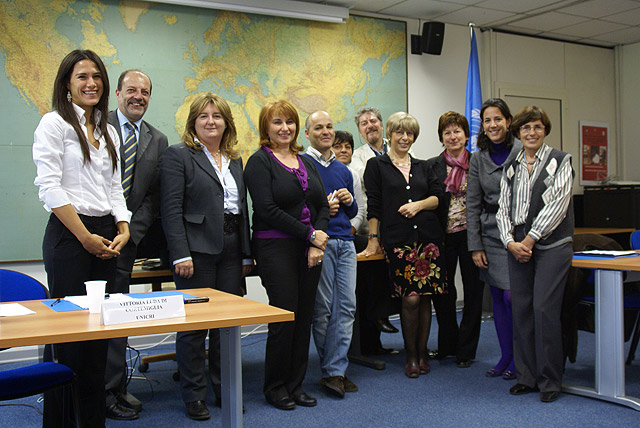

News
Trafficking of Women in Nigeria
First Meeting for Decentralised Cooperation
UNICRI met yesterday with various representatives of Italian regions and experts from the Italian Cooperation to establish a new platform for decentralised cooperation within the programme: "Preventing and Combating Trafficking of Minors and Young Women from Nigeria to Italy" funded by the Italian Ministry of Foreign Affairs.
16 October 2008. The UNICRI programme, the first phase of which was launched in 2002, aims to reduce the vulnerability of women and children to trafficking by strengthening educational, economic, and social capacities of Nigerian institutions and organizations.
The second phase of the project, implemented in cooperation with UNODC, the Nigerian agency against trafficking (NAPTIP), and a coalition of Nigerian NGOs (ENCATIP), has been in operation since March 2008. The purpose of this phase is to build upon the excellent results obtained during the first period.
Sandro Calvani, UNICRI’s director argued that the success of the first phase is a good basis for a combined and comprehensive policy in order to reduce, and eventually render this slavery obsolete.
The inclusion of Italian regional authorities is part of a bigger strategy to tackle the curse of the traffic of women and children between Nigeria and Italy, with a bilateral approach. Creating the conditions to decrease the exposure of Nigerians to the phenomena, and support Nigerian authorities in developing and enforcing appropriate measures could be reinforced by cooperation from the two sides in the form of a joint action. Indeed, one part of the solution could be promoting mutual agreements and solutions to achieve a cohesive policy.
In this regard, this multilateral strategy mirrors one of the purposes of the programme which is the creation of a network of Italian and Nigerian NGOs, and to boost the establishment of an enlarged network at a European level.

Download article
Tuesday 14 October 2008
16 October 2008. The UNICRI programme, the first phase of which was launched in 2002, aims to reduce the vulnerability of women and children to trafficking by strengthening educational, economic, and social capacities of Nigerian institutions and organizations.
The second phase of the project, implemented in cooperation with UNODC, the Nigerian agency against trafficking (NAPTIP), and a coalition of Nigerian NGOs (ENCATIP), has been in operation since March 2008. The purpose of this phase is to build upon the excellent results obtained during the first period.
Sandro Calvani, UNICRI’s director argued that the success of the first phase is a good basis for a combined and comprehensive policy in order to reduce, and eventually render this slavery obsolete.
The inclusion of Italian regional authorities is part of a bigger strategy to tackle the curse of the traffic of women and children between Nigeria and Italy, with a bilateral approach. Creating the conditions to decrease the exposure of Nigerians to the phenomena, and support Nigerian authorities in developing and enforcing appropriate measures could be reinforced by cooperation from the two sides in the form of a joint action. Indeed, one part of the solution could be promoting mutual agreements and solutions to achieve a cohesive policy.
In this regard, this multilateral strategy mirrors one of the purposes of the programme which is the creation of a network of Italian and Nigerian NGOs, and to boost the establishment of an enlarged network at a European level.

Download article Tuesday 14 October 2008



